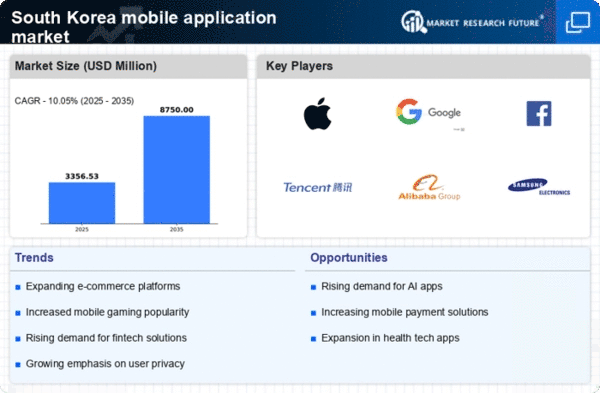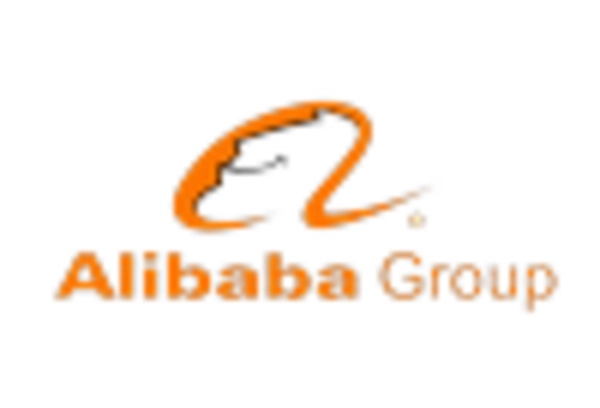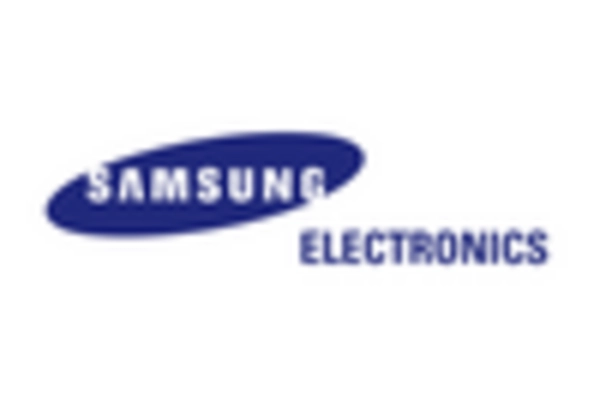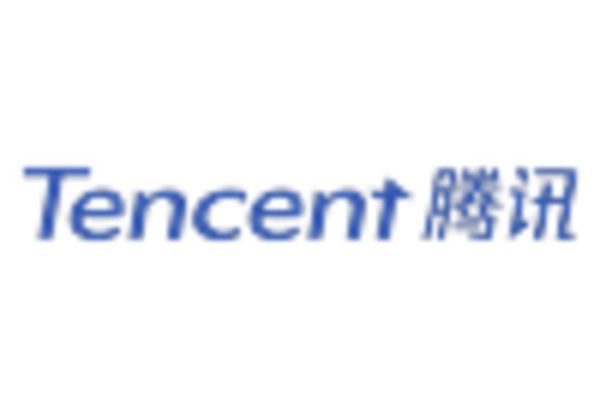Growing Demand for Mobile Gaming
The mobile application market in South Korea is significantly influenced by the growing demand for mobile gaming applications. As of 2025, mobile gaming accounts for approximately 60% of the total gaming revenue in the country, indicating a robust consumer preference for gaming on mobile devices. This trend is fueled by the increasing availability of high-quality games and the rise of competitive gaming, which attracts a diverse audience. Additionally, the integration of social features within gaming applications enhances user engagement, leading to longer play sessions and increased in-app purchases. The mobile gaming sector is also benefiting from collaborations between developers and popular franchises, which can drive user acquisition and retention. Consequently, the growing demand for mobile gaming is a vital driver for the mobile application market in South Korea.
Surge in Mobile Payment Solutions
The mobile application market in South Korea experiences a notable surge in mobile payment solutions, driven by the increasing adoption of digital wallets and contactless payment methods. As of 2025, approximately 70% of smartphone users in South Korea utilize mobile payment applications, reflecting a shift towards cashless transactions. This trend is further supported by government initiatives promoting digital finance, which aim to enhance financial inclusion and streamline payment processes. The convenience and security offered by these applications are likely to attract more users, thereby expanding the mobile application market. Additionally, partnerships between financial institutions and tech companies are fostering innovation in payment solutions, leading to the development of advanced features such as biometric authentication and real-time transaction tracking. Consequently, the growth of mobile payment solutions is a significant driver for the mobile application market in South Korea.
Expansion of 5G Network Infrastructure
The mobile application market in South Korea is poised for growth due to the rapid expansion of 5G network infrastructure. As of November 2025, South Korea boasts one of the most advanced 5G networks globally, with coverage reaching over 90% of urban areas. This enhanced connectivity facilitates the development of high-performance applications that require low latency and high data speeds, such as gaming, streaming, and augmented reality. The increased bandwidth allows developers to create more sophisticated and engaging user experiences, which could lead to higher user retention rates. Furthermore, the proliferation of 5G technology is likely to encourage innovation in various sectors, including education and healthcare, where mobile applications can provide real-time data and services. Thus, the expansion of 5G networks serves as a crucial driver for the mobile application market in South Korea.
Rise of Health and Fitness Applications
The mobile application market in South Korea is witnessing a rise in health and fitness applications. This trend reflects a growing consumer focus on wellness and personal health management. As of November 2025, approximately 40% of smartphone users in South Korea utilize health-related applications, ranging from fitness trackers to mental health support tools. This trend is likely influenced by an increasing awareness of health issues and the desire for convenient solutions to monitor and improve well-being. The integration of features such as personalized workout plans, nutrition tracking, and telehealth services enhances the appeal of these applications. Furthermore, partnerships with healthcare providers and fitness influencers may drive user engagement and credibility. Thus, the rise of health and fitness applications represents a significant driver for the mobile application market in South Korea.
Increased Focus on User Privacy and Security
In South Korea, the mobile application market is increasingly influenced by a heightened focus on user privacy and security. With growing concerns over data breaches and privacy violations, consumers are becoming more discerning about the applications they use. As of 2025, nearly 75% of users express a preference for applications that prioritize data protection and transparent privacy policies. This trend is prompting developers to implement robust security measures, such as end-to-end encryption and user consent protocols, to build trust and enhance user experience. Additionally, regulatory frameworks are evolving to address privacy concerns, which may influence application development practices. Consequently, the increased focus on user privacy and security is a critical driver for the mobile application market in South Korea.
















